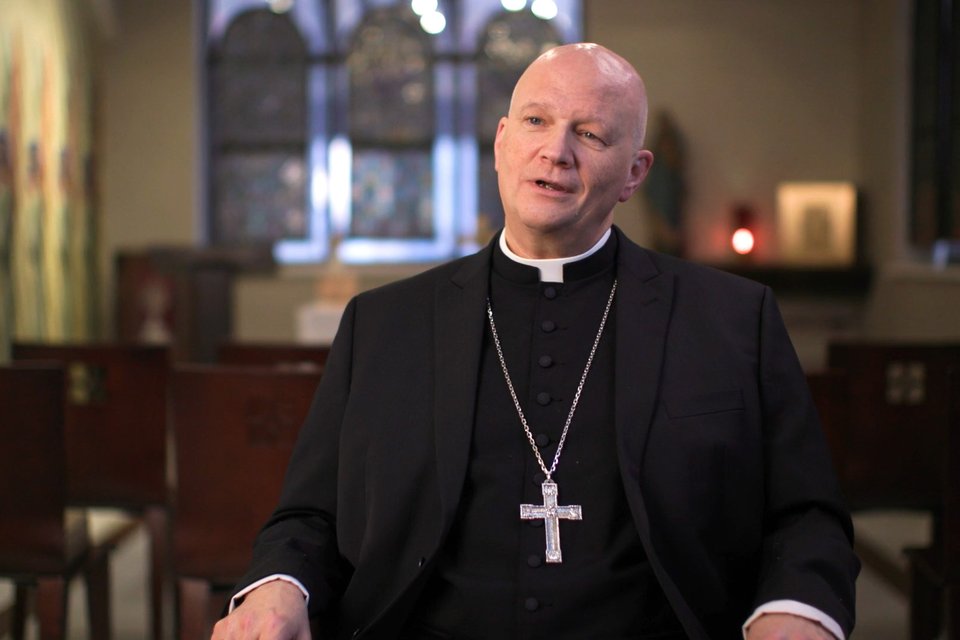VATICAN CITY (CNS) -- "Could the coronavirus-19 crisis lead to a jubilee?" Filipino Cardinal Luis Antonio Tagle wondered out loud during a Mass live-streamed from the Pontifical Philippine College in Rome.
Preaching March 29 about the story of Jesus raising Lazarus from the dead, Cardinal Tagle looked at a variety of ways people can be in "tombs" and in need of light, fresh air and new life.
Looking specifically at the coronavirus pandemic, Cardinal Tagle, president of Caritas Internationalis and prefect of the Congregation for the Evangelization of Peoples, pointed out how people are losing their jobs, "especially the daily wage earners, and that lack of resources and that poverty could be one tomb right now for many poor people."
"Could those who could afford to (do so) go to those tombs and release the poor people who owe them money, release them from their debt?" he asked.
And could rich countries do the same for poor countries, he continued, calling for a forgiveness of foreign debt so that impoverished nations can use the few resources they have to fight the virus and help their people rather than making huge interest payments.
"Could the coronavirus-19 crisis lead to a jubilee, a forgiveness of debt so that those who are in the tombs of indebtedness can find life?" he asked.
Many Catholics know the term "jubilee" in relation to the church's holy years -- special times of prayer and pilgrimage with a focus on forgiveness of sins.
The term comes from the Book of Leviticus, which prescribed an observance every 50 years that included concrete actions to restore property to the poor, forgive their debts and release them from servitude.
Eric LeCompte, executive director of the Jubilee USA Network, a multireligious group that advocates for foreign debt relief for the world's poorest countries, told Catholic News Service the network is urging the International Monetary Fund, the World Bank and wealthy countries "to suspend debt payments for poor countries so they can bolster healthcare; offer a process for debt to be eliminated for developing countries; make it easier for all countries to restructure their debt; and provide aid and financing to all countries so they can survive the growing health and economic crisis."
The world's poorest countries "need total relief now so they can bolster health care and survive the economic crisis" that is being created by the coronavirus pandemic and will "likely be the greatest financial crisis since the Great Depression," he said.
LeCompte urged Catholics to lobby their governments "to ensure there are stimulus packages that protect the most vulnerable and ensure that workers continue to get paychecks" and to "support Catholic Charities, Caritas and Catholic Relief Services as they are the first line of defense as the economic crisis worsens."
In his homily March 29, Cardinal Tagle also looked at where nations spend their money, noting that "we don't have enough masks when there are more than enough bullets" and "we don't have enough supplies or ventilators," but countries spend millions on just one warplane.
A few hours after Cardinal Tagle celebrated his Mass, Pope Francis formally endorsed the call of U.N. Secretary-General Antonio Guterres for a global cease-fire to enable nations to focus on battling the coronavirus pandemic.
In an email response to questions, the cardinal told CNS, "The present crisis has revealed many things that I consider disturbing," for example, "it is shameful that some countries have large reserves of weapons but lack medicines, masks, protective equipment and basic food."
"It is unbelievable that some people in authority use this emergency for political and ethnic bashing when the virus does not choose the race and political persuasion of a person to be infected," he said.
Instead, the cardinal said, "this crisis could become a 'kairos' (special moment) for peace and reconciliation if we, as one human family, have the humility" to accept that discrimination, prejudice, domination, violence and misplaced spending priorities are "folly."
"In other words," he said, "the pandemic could teach us to review our priorities as individuals, nations and one human family."
"This emergency urges all of us to help save lives," the cardinal wrote. "Our common foe is the infection. We are not each other's enemy. The proposed cease-fire reminds us that we must be protecting or saving each other, not killing each other. And my hope is that after the COVID-19 pandemic is over -- hopefully soon! -- the cease-fire would continue as a global way of life. This is my hope."
Cardinal Tagle said he suggested a jubilee "so that the poor could survive now and forge a future."
"In my wild imagination," he said, "it would not be a bad idea to have an 'extension' of the extraordinary Jubilee of Mercy," the special Holy Year proclaimed by Pope Francis and held in 2015-2016.
"Pope Francis has already granted the plenary indulgence to those infected with COVID-19, to health workers" and others working and praying for an end to the pandemic. At the urging of the pope, the Apostolic Penitentiary, a Vatican tribunal dealing with matters of conscience, issued a decree proclaiming the indulgence and offering instructions for "perfect contrition" for the forgiveness of sins when people cannot go to confession.
"Can we follow his lead when it comes to individual and national debts?" Cardinal Tagle asked.









